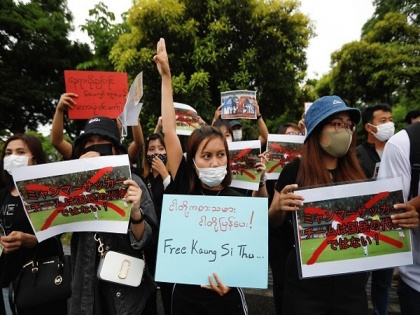Myanmar military torturing detainees to know whereabouts of opponents, says released US journalist
By ANI | Published: June 27, 2021 10:39 AM2021-06-27T10:39:25+5:302021-06-27T10:50:02+5:30
Myanmar's military is using torture to extract information from detainees on the whereabouts of senior opposition members and activist leaders, an American journalist recently released from a Yangon prison told CNN.

Myanmar military torturing detainees to know whereabouts of opponents, says released US journalist
Myanmar's military is using torture to extract information from detainees on the whereabouts of senior opposition members and activist leaders, an American journalist recently released from a Yangon prison told CNN.
The 44-year-old Nathan Maung was detained for over three months in Myanmar before being deported to the United States on June 15. He said that he had endured two weeks in a secretive military-run interrogation center in the country's biggest city Yangon.
Speaking to CNN on Wednesday, Maung described his time in the facility as "hell" and said he prepared himself to die there, believing the soldiers would kill him.
He is one of more than 6,200 people arrested since Myanmar's military, led by General Min Aung Hlaing, seized power in a coup on February 1, according to advocacy group Assistance Association for Political Prisoners (AAPP), a rights group that keeps track of political prisoners in Myanmar.
Maung, the co-founder and editor in chief of the Myanmar online news site Kamayut Media, was arrested on March 9 alongside co-founder and news producer Hanthar Nyein, 39, as security forces raided their office.
He said that after he was taken to an interrogation centre, he and Nyein were beaten, denied water for two days and food for three days. They were also handcuffed and blindfolded for nearly the entire two weeks they were there.
"They started with a blindfold and handcuffs and then started questioning. They kicked our face, hands and shoulder, all the time. For every answer, they beat us. Whatever we answered -- whether correctly or incorrectly -- they beat us. For three days, non-stop," he told CNN.
This torture carried on for eight days, during which the detainees would be moved between the houses and cells, said the American journalist.
Maung believes the soldiers were pressuring Hanthar Nyein to hand over his phone password, which would give them access to his encrypted communications and phone records with high profile opposition and activist leaders.
However, when the soldiers discovered he was a US citizen, the beatings stopped. "They stopped beating me and started asking questions about why the US government sent me and were giving me US funding, if I was working for the CIA -- those kind of stupid questions. I said no, I'm a journalist, no one gave me money," said Maung.
After 15 days, Maung said he was transferred to a detention centre adjoining Myanmar's Insein Prison, an overcrowded penitentiary of about 10,000 inmates that has a reputation for ill-treatment and terrible conditions.
He was one of at least 88 journalists arrested since the military takeover as part of a crackdown on independent media. Many media workers have been forced into exile abroad or have fled to rebel-controlled areas in the jungles, CNN reported.
The military junta has struggled to consolidate its power over the whole country, as it continues to face mass public opposition. Large-scale nationwide protests seen in the months following the takeover were brutally suppressed as security forces resorted to gunfire.
Maung said the international community cannot stand by while the junta continues to operate with impunity and lawlessness against its people and called for "aggressive action" against the military.
"We don't have time to wait and see. There are thousands refugees going to flee to the border, a humanitarian crisis happening now," he said.
Since the February military coup in Myanmar that ousted the democratically elected government led by civilian leader Aung San Suu Kyi, who turned 76 on Saturday, she and other prominent politicians have been detained and hundreds of civilians have been killed by security forces.
As of Saturday, 881 people had been killed by the military junta since the coup, with around 5,100 others in detention, according to the AAPP.
Human Rights Watch on Tuesday reported that many of the thousands of people arbitrarily detained by the military have been subjected to torture, routine beatings and other ill-treatment since the coup, according to CNN.
"Myanmar's military and police often hold detainees in custody for extended periods, in overcrowded and unhygienic interrogation centers and prisons. Those detained are frequently kept incommunicado, unable to contact relatives or legal counsel," the organization wrote in the report.
( With inputs from ANI )
Disclaimer: This post has been auto-published from an agency feed without any modifications to the text and has not been reviewed by an editor
Open in app